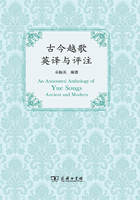
Comments and Annotations
This song is an excerpt from the 11th volume of Garden of Doctrines and Theories (《说苑》), a book written by Liu Xiang (刘向, appr. 77-6 BC) of the Han Dynasty, which comprises introductions and annotations to the classics that the author had collated. The song expresses the Yue’s love for the Prince of E and demonstrates her courageous pursuit for it in spite of the tethers of social ethics and rites. Part of the story about the Prince of E (named Zixi, the prime minister of the State of Chu) and the Yue boat-woman goes as follows:
In the year 528 AD, the Prince of E held a grand ceremony, at which a Yue boat-woman sang him a song. As the song was sung in the boat-woman’s own language, the prince didn’t understand it. When it was rendered impromptu into the official language of Chu, the prince, deeply touched, stepped forward to the boat-woman, gave her an embroidered cloak and embraced her.
The transliterated version of the original is hardly under-standable. According to Garden of Doctrines and Theories it goes as follows:
滥兮抃草滥予昌枑泽予昌州州州焉乎秦胥胥缦予乎昭澶秦踰渗惿随河湖
For the readers’ information, about the interpretation of the song there exist view points different from those of the present anthology.
One of the issues is about the sex of the Yue. Some scholors insist that the Yue who sculled for the prince was of the male sex, and accordingly the song is regarded as one of homosexuality. Offered as one of the reasons is Anne Birrell’s translation, in which the translator is said to explicitly allege “that the Yue’s song is one of homosexual love.” For information about the divergence in the sex of the Yue and in interpreting “绣被”, please refer to Appendix I: Inquiries and Discussions, No. 2.
Another issue is about the interpretation of “不訾诟耻”. Some scholars hold that “不訾” means “not to impose upon”, and thus they paraphrase the line as “do not despise me, let alone scold me.” Actually, one of the meanings of “訾” is “consider”, “take into account” or “think of,” which is adopted in the present book.
Accessible are four English versions of the song, which are cited below for the readers’ reference:
Version 1:
What an evening is it?
I’m in a boat flowing in the river.
What day is it today?
I’m in the same boat with the prince.
I feel shy and flattered,
Not ashamed, but honored.
My heart will go on
With the prince as a friend.
Trees grow thick in the hills,
Trunks with twigs and leaves.
My love goes to the prince
But he does not know it.
(王宏印, 2014: 10—11)
Version 2:
What a fine evening this is that I’ve come to this ilslet midstream,
What a fine day this is that I share a boat with you, my prince!
Unworthy that I’d be so desired when have I ever felt such shame?
My heart’s perplexed to no end that I’ve come to know you, my prince!
There are trees in the mountain and branches on trees
I yearn to please you but you do not know.
(tr. Irving Yuchen Lo, 引自马明蓉、戎林海, 2016: 59)
Version 3:
What night is this
That I steer in the mid-stream?
What day is this
That I share the boat with the lord?
So attached am I to you
That I care not the humiliation.
Eagerly I yearn
To acquaint with my lord.
Trees grow on mountains and boughs grow on trees,
But why don’t you know my mind?
(汪榕培等, 2003: 14)
Version 4:
What a fine day
That I row the boat for Prince today!
What a nice night
That in midstream Prince by my side!
Low as I am
How shameful to win your love!
My heart wrenches to no end
Since I know you, my Prince!
On the hills are trees and on trees branches grow,
Longing fills my heart deep yet you do not know.
(马明蓉、戎林海, 2016: 60—61)
Version 5:
PREFACE. The ruler of Ngo kingdom in the state of Ch’u, Tzu-hsi, was travelling in a blue-plumed boat with a kingfisher awning. The Yueh oarsman fell in love with Tzu-hsi, and sang a song as he plied the oars. The ruler of Ngo was touched. Full of desire he raised his embroidered quilt and covered the boatman.His song went like this:
Tonight, what sort of night?
I tug my boat midstream.
Today, what sort of day?
I share my boat with my lord.
Though ashamed, I am loved.
Don’t think of slander or disgrace!
My heart will never fail,
For I have known my lord.
On a hill is a tree, on the tree is a bough.
My heart delights in my lord, though he will never know.
( tr. Anne Birrell, 引自李贻荫, 1988: 71—72)